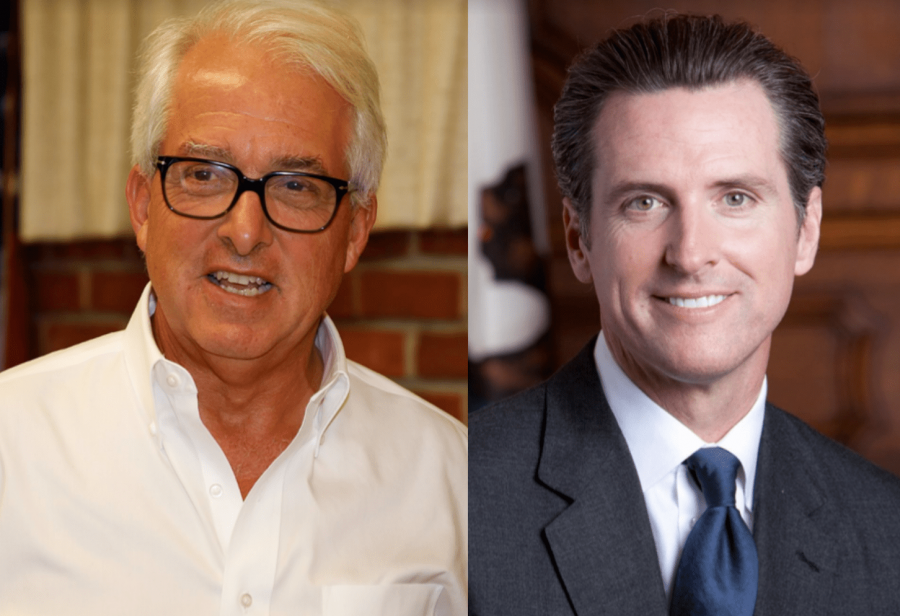Californians will decide next week between two very different candidates for governor.
Lieutenant Governor Gavin Newsom, former mayor of San Francisco, supports the state’s sanctuary law.
John Cox, a political outsider and businessman, wants to do away with it.
Newsom supports the bullet train and what’s known as the “gas tax.” Cox supports neither.
Newsom wants single-payer healthcare, which essentially is healthcare paid for and run by the state government. Cox does not.
That’s according to detailed descriptions of their platforms on the candidates’ campaign websites as well as the perspectives they aired earlier this month in the only debate they’ve had — a KQED public radio forum in San Francisco. Neither candidate could be reached, despite calls and emails.
Political experts say the race may not be as close as some had predicted.
A Public Policy Institute of California study shows that the gap between the candidates narrowed between July and September.
“The gap between Newsom and Cox went from 24 points down to 12 points. From that standpoint we’re not seeing a race that is necessarily all that close, but it does seem to be somewhat fluid,” said Dean Bonner, the associate survey director of the Institute’s statewide survey.
Some voters — especially those who are undecided or not affiliated with a party — are disappointed about the lack of dialogue between the candidates.
“Newsom is a huge frontrunner. He has no reason to agree to a bunch of public debates because that just totally helps Cox,” said Taylor Dark, a professor of political science at Cal State Los Angeles.
Some voters have taken note of the candidates’ opposing views on immigration.
Diana Escamilla, a downtown organizer for the Coalition for Humane Immigrant Rights of Los Angeles, told the UT that Cox “could definitely” work to repeal the sanctuary law: “Just like President Trump was saying he was going to take away DACA. He hasn’t been able to totally take it away, but he has definitely made it so new folks can’t apply to it. At this point, I’m not taking anything off the table and saying ‘no,’ that’s not possible.”
Meanwhile, Newsom has promised to pursue a state-supported single payer healthcare system, according to his campaign site. However, some critics say he hasn’t outlined a clear plan on how to do that.
“I don’t think [single payer] is politically viable yet. Even the speaker of the assembly last year killed it basically because the advocates were trying to move a single payer bill and pass it but there was no money in it. It was not clear how they were going to fund it. It’s just not ready for prime time yet. My own view is it will never be ready completely because there will always be people who want private insurance. It’s hard to see how it will be financially viable,” said Walter Zelman, chair of the Department of Public Health at Cal State Los Angeles.
When it comes to California’s transportation and infrastructure, Newsom opposes repealing the so-called “gas tax” and supports the high-speed rail project. In contrast, Cox supports the repeal and has said that he would work to kill the project, if elected. That’s according to an interview he gave with KTVU.
As for education, Cox has expressed support for a voucher system for low-income students and wants an investigative review of the entire California education system. Newsom is attempting to work toward universal pre-school in the state, and also wants to launch college savings accounts for all incoming kindergarten students in California. This is according to their respective campaign sites.
One area the candidates agree on is the need to develop new homes to combat the state’s housing crisis.
Critics say that may be harder to do than it seems.
For instance, Dark said most residents don’t want new buildings squeezed in between existing homes and certain local zoning regulations and other issues can make it difficult or too expensive to build new multi-family homes.
“We need to have density, and more apartment buildings. It’s very hard to build those now. You have to increase the supply,” Dark said. “What that means is probably fighting against local governments and taking away some of their power when it comes to zoning and other rules that affect local development. That means [the governor] is going to make enemies.”








